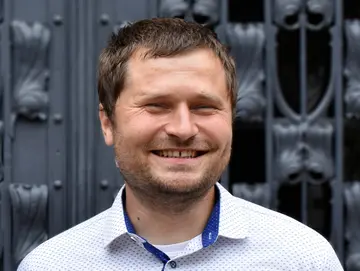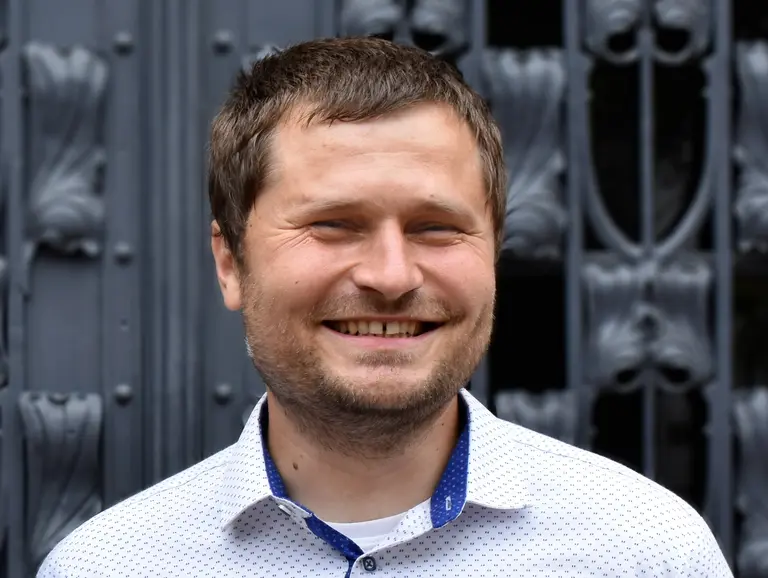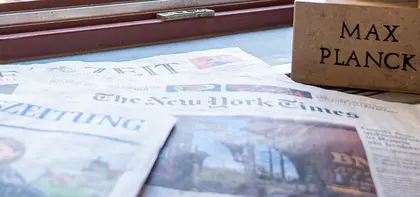
Future Proof — Mateusz Michałek
Published Oct 19, 2020
Mateusz Michałek has build up an impressive Max Planck history: During his postdoc years he initially worked at the institute in Bonn before he came to MiS in 2016 first as a postdoc and later as a visiting scholar. In March of 2017, he took the leap of becoming a research group leader of the group “Combinatorial Algebraic Geometry”. Together with his group he looked for applications of algebraic methods to topological problems, improved methodologies in fast matrix multiplication and investigated toric geometry and tensors, as well as the combinatorial aspects of polytopes. Besides his postdoc endeavors at the mathematical MPIs he also stayed at Barcelona University, FU Berlin, UC Berkeley, RIMS Kyoto and is an assistant professor with the Polish Academy of Sciences. Together with Bernd Sturmfels he authored the book “Invitation to Nonlinear Algebra”, which aims to provide the theoretical basis for recent advances in computation and other applications. In October 2020 Mateusz became professor of Geometry (Real Geometry and Algebra) at the University of Konstanz.
Interview
How did you get into math?
Mateusz Michałek: I guess I always knew my calling was to become a mathematician. In remember receiving only a ‘very good’ evaluation in math and ‘exceptional’ in Polish in first grade of elementary school. I couldn’t fathom why, as I was sure that I was way better in math than in Polish. It was only after some years that my parents told me that ‘exceptional’ was not granted in first grade, since there isn’t all that much math to speak of at that stage. It was thanks to my fourth-grade math teacher Mrs. Teresa Lekawska that I dived deeper into the realm of math, as she encouraged me to do extra exercises, take part in competitions and follow additional courses. Another tremendously positive influence was my uncle, Tomasz Michałek. He was a young computer arts student in Cracow when we started our weekly meetings, where he taught me some things that went way beyond my education at school and instead delved into his university education. This sounds extraordinary, however in Poland the university math courses start with more basic things than primary education. Formal introduction of set theory, functions, and induction, it surely takes some time until you learn that 1+1=2. At this point mathematical notation came more natural to me than using the 'standard' language. I was very much disappointed to discover years later that true mathematicians actually write articles in 'standard' language - not just mathematical symbols. My parents also told me later that they were often hesitant to enter the room when Tomasz and I were doing math, as we were actually fighting and shouting pretty regularly in the process. It was a lot of fun!
What would you would like to accomplish?
As most mathematicians, I would like to solve some fundamental problem. The one I am currently working on is related to finding optimal ways of computing the determinant or multiplying matrices. This is very much related to the question that people were studying for millennia: how to solve a system of linear equations?
Why did you choose to become a scientist at MiS?
It was a combination of quite a few factors. I already spent a year at the MPI in Bonn, so I knew that MPIs offer the highest possible research standards. At the same time my wife was offered a postdoc at the UFZ in Leipzig and Bernd Sturmfels, with whom I had worked before, became MiS director. I was offered an absolutely great position; probably one of the best in the world a young mathematician may hope for. Thus, the choice was very clear for me.
What advice would you give young researchers starting out at the institute?
In many games, like chess or go, we start by learning the rules. Then we learn some tricks that allow us to outperform people who merely know the rules. The next, extremely powerful, step is usually to start planning a few moves ahead. While this is not a universal advice to solve mathematical problems, I think it’s a wise choice to somewhat plan out your mathematical career. You don’t have to follow these plans to a T, which is usually impossible anyways, but it is good to have them - even if it’s just to have the option to ignore them later.
Which scientist would you love to work with?
To be honest, I simply contact anyone that I’d like to cooperate with. To the surprise of my fellow students I could get acquainted with senior professors at the university by simply knocking on their doors and had no problems contacting a Fields medalist even as a bachelor student. The main reason for the ease of these approaches was that I always felt very welcome: thus, maybe one more advice for young researchers is to not be afraid to discuss math with anyone you like!
Research
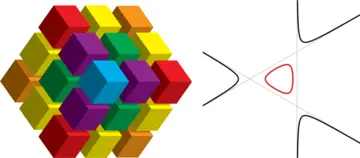
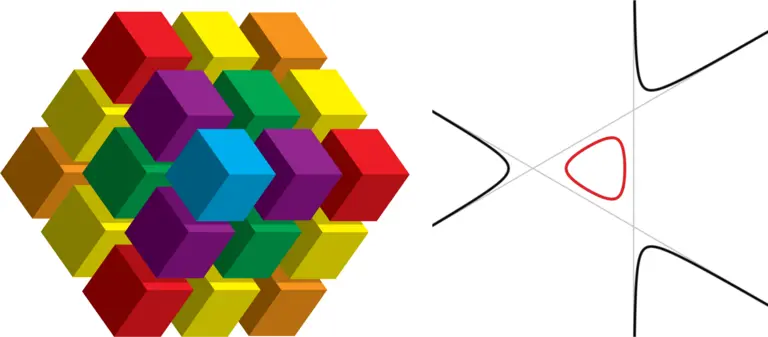
How fast can matrices be multiplied? How can quantum states of many particles be represented efficiently? How can Markov processes be reconstructed, represented and applied to study the evolution of species?
All of these, at first glance unrelated questions are the motivation for some of Mateusz' research directions. They are all related to tensors, algebra and geometry. Classical linear algebra provides some of the most useful and most frequently applied tools, both in pure and applied mathematics. Novel and challenging problems, that come with advances in computational sciences, often arise in non-linear algebra. Just as matrices form the basic objects of linear algebra, tensors constitute the focal point of multilinear algebra. It turns out that their properties are much more intricate than those of matrices. This leads to fundamental open problems that often can be phrased in both a geometric and an algebraic language. As tensors are ubiquitous in many different branches of mathematics, so are the tools to study them, as they often require an interplay of different methods. Mateusz works on tensor problems by trying to solve them through the application of combinatorial, algebraic and geometric methods.
Notable honors and publications
Honored with the Kazimierz Kuratowski Award in 2015 by the Institute of Mathematics of the Polish Academy of Sciences and the Polish Mathematical Society.
- M. Michałek and Y. Shitov, Quantum Version of Wielandt’s Inequality Revisited, IEEE Transactions on Information Theory, vol. 65, no. 8, pp. 5239–5242, Aug. 2019.
- J. Buczyński, T. Januszkiewicz, J. Jelisiejew, M. Michałek, Constructions of \(k\)-regular maps using finite local schemes, J. Eur. Math. Soc. 21 (2019), 1775–1808.
- J. Landsberg, M. Michałek, On the geometry of border rank algorithms for matrix multiplication and other tensors with symmetry, SIAM Journal on Applied Algebra and Geometry 1 no. 1 (2017), 2–19.
- M. Michałek, B. Sturmfels, C. Uhler, P. Zwiernik, Exponential varieties, Proceedings of London Mathematical Society 112 no. 1 (2016), 27–56.
- M. Lason, M. Michałek, On the toric ideal of a matroid, Advances in Mathematics 259 (2014), 1–12.
Scientific Contact
Mateusz Michałek
Editorial Contact
Discover More
-
www.mathematik.uni-konstanz.de
Mateusz Michałek on the Konstanz University website
-
Download
Book Presentation “Invitation to Nonlinear Algebra”
-
Download
Download the pdf booklet of this Future Proof article
Related Content
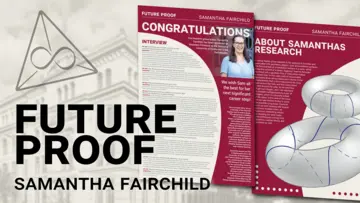
Future Proof - Samantha Fairchild Future Proof - Samantha Fairchild
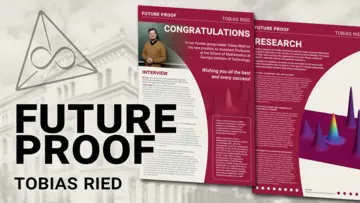
Future Proof - Tobias Ried Future Proof - Tobias Ried
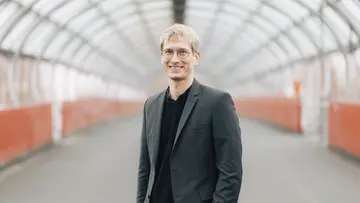
Benjamin Gess Appointed as Professor at TU Berlin Benjamin Gess Appointed as Professor at TU Berlin

